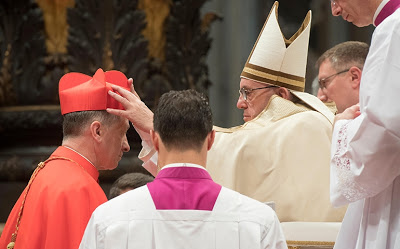

| Online: | |
| Visits: | |
| Stories: |

| Story Views | |
| Now: | |
| Last Hour: | |
| Last 24 Hours: | |
| Total: | |
TradCatKnight: Birds (Heretics) of a Feather: Cardinal Cupich: Francis is giving new life to Vatican II reforms
Birds (Heretics) of a Feather: Cardinal Cupich: Francis is giving new life to Vatican II reforms
In his four years as the leader of the global Catholic Church, Pope Francis has been giving new life to the reforms of the Second Vatican Council, says Chicago Cardinal Blase Cupich.
In an NCR interview in advance of the March 13 anniversary of Francis’ election, the cardinal said the pontiff is “reinvigorating that experience of the church” that people had following the reforms of the 1962-65 council.
In the interview, which took place at the Pontifical North American College in late February, the cardinal spoke at length about the pope’s leadership style of collaboration and consensus-building, and his efforts to reform the Vatican bureaucracy.
“I don’t think Francis has a template with regard to what a reformed structure looks like, but I do think that his vision of seeing that Christ is the one who is leading the church, and we are to be attentive to that, will make clear what that structure should look like,” said Cupich.
“He’s constantly going back to that question: Where is Christ calling us now?” he said. “And then let’s build any kind of reform around that. He has to have that vision, but it’s a vision about what Christ is wanting us to do, not what he wants to do.”
Cupich also spoke about those who might find Francis’ discussion-based style of leadership — evinced by the two-year synod process he underwent before writing his apostolic exhortation Amoris Laetitia — discomforting.
“People are impatient with a process that doesn’t give … immediate answers,” he said. “We live in an age of immediacy, where we want everything now — our phone connection doesn’t happen right away, the internet is down and we’re not getting any information, we have problems with planes being late. We want it now.”
“There is a temptation to have shortcuts and not put in the time and the effort,” he said. “I think you have to be willing to talk to people and sit sometimes around a table and listen to other people.”
Following is the full interview with Cupich, edited slightly for clarity and context.

NCR: Is there anything that you think has been overlooked or underappreciated about what the pope is doing?
Cupich: Let me put it in a more personal way. I came into the seminary 50 years ago this fall. In 1967, I had just graduated from high school. It was right on the heels of the Second Vatican Council. And I don’t think that I have had a sense of the freshness of the council more than what I do at this point.
In many ways, I find him reinvigorating that experience of the church, what we experienced during the Second Vatican Council. In many ways, [he] is giving new life to it. I find that very personal.
At the same time, I think that as I read the reaction of people to him I think back to how people were responding to the council with that same sense of hopefulness and joy, pride about the church that we saw at that time.
Plus, the fact that he now is emerging as a world leader and speaking about issues that have a global impact, probably more than any other leader today. He seems to have that reach across cultures, across language groups, national boundaries, that has a great appeal to people.
If you had to boil down the pope’s vision for the church into a phrase or a theme, how would you do that?
Gaudium et spes. The hopes and the joys. But also, the struggles, the sorrows that people have. He is united with them. The church claims to be an expert in humanity, and an expert about humanity. I think that the pope is really trying to, in many ways, express the aspirations of humanity but also the challenges it faces today, much like the document Gaudium et spes did. That’s how I would sum it up.
The pope has expressed a clear vision of what he thinks the church should be. We can point to Evangelii Gaudium or Amoris Laetitia. But he is also trying to do structural reform. How do you see him balancing the expression of his vision with structural reform?

I don’t see necessarily any tension between doing those two because I do think that you can’t have a structural reform without a vision, because otherwise you’re just moving the deck chairs on the Titanic.
I think that he does have a sense of purpose and mission about what he’s doing. He’s not doing reform just to do reform, he’s doing it because of the vision that’s there. He wants to situate the church for its future in order to live out that vision.
But I think that central to the vision — and you see this in Amoris Laetitia — is that there is a divine pedagogy, not just for the individual but for the church. So not only is there a need for discernment for the individual about his or her life, but there is a need for a discernment about where Christ is leading the church.
I don’t think Francis has a template with regard to what a reformed structure looks like, but I do think that his vision of seeing that Christ is the one who is leading the church, and we are to be attentive to that, will make clear what that structure should look like. He is following a divine pedagogy that way.
This is what he’s doing with the Council of Cardinals that’s helping him. They’re not there just coming with their own ideas about how the church should operate with its various offices, structurally. But he’s constantly going back to that question: Where is Christ calling us now? And then let’s build any kind of reform around that. He has to have that vision, but it’s a vision about what Christ is wanting us to do, not what he wants to do.
That’s where I think that he really gets his confidence. And he’s not daunted by critics or people who in some way misunderstand him. Because he’s free enough to be able to move forward, simply because he’s pursuing the call of Christ.
I think he’s free not in the sense of ignoring other people and doing what he wants, but he’s free in order to be responsive to where he sees the call of Christ beckoning the church. That’s the freedom that he enjoys, and that’s the blessing that I think that he is to us.

Pope Francis raises the Book of the Gospels during the closing Mass of the Synod of Bishops on the family in St. Peter’s Basilica at the Vatican Oct. 25, 2015. (CNS/Paul Haring)
The pope has focused a lot on collaboration and consultation. In Laudato Si’ he cited many different bishops’ conferences. Amoris Laetitia was released after two Synods of Bishops. Is the way he is doing that consultation something new, a shift for the church?
Yes. It’s a synodal model. The synod is not just an office, but it’s a way of being church.
That’s something that I have always tried to do when I’ve had positions of leadership, whether I was at the seminary or pastor of a parish or the head of a diocese, no matter how small or large it was.
Related: Cardinal Cupich shoulders Chicago’s Catholic future (Dec. 5, 2016)
I find that it does two things. First of all, it gives you insight into what the issue is by hearing other voices. And secondly, it keeps you from the temptation that you have to in some way make all the decisions, and the weight falls on you.
Or even worse, that you make your work an exercise in your own ego being affirmed. Because there is a temptation at times to make your whole work an exercise in narcissism, where you want to in some way prove yourself by the decisions that you make.
That’s very tempting to people who are in positions of authority. You want to build this building, you want to do this particular task that you want to leave behind as a legacy. I think that if you do that you’re really not going to be free to address the issues that are there because you’re going to be blinded by the task that you think is going to affirm your own ego.
I think that he has that kind of freedom to be able to get the insights of other people but at the same time make sure he’s free from that temptation.
I’m wondering what you might say to people who aren’t comfortable with this discussion-based style of leadership and maybe want more clear answers, or want the pope to say something very clearly.



